Dental Implants – Murphy, TX
Turn Back The Clock on Tooth Loss
Do you need to replace one or more natural teeth? At Murphy Family Implant and Cosmetic Dentistry, you'll find a strong, beautiful alternative to traditional bridges, partials, and full dentures. Known as dental implants, they can help you achieve results that look, feel, and function virtually indistinguishable from natural teeth. Our talented doctors are happy to provide every stage of this transformative procedure right here in-office for maximum convenience and comfort. Contact us to learn more about tooth replacement with dental implants in Murphy,TX.
Why Choose Murphy Family Implant and Cosmetic Dentistry for Dental Implants?
- Surgical Implant Placement & Restoration In 1 dental Office
- FREE Dental Implant Consultation
- Dental Insurance Welcomed & Payment Plans Available
Benefits of Dental Implants

Unlike traditional tooth replacement options, dental implants are truly comprehensive in that they replicate every part of the natural dental structure, including the root that exists underneath the gum tissue. As a result, there are countless benefits of dental implants in Murphy that you simply can’t get with regular dentures or dental bridges. Here are just a few of the ways that dental implants can transform your quality of life!
Day-to-Day Benefits

- Freedom to eat what you want – Instead of merely sitting on top of the gums, dental implants are firmly rooted in your jaw. Therefore, they restore almost all of the biting and chewing force of your natural teeth. You should be able to chow down on your favorite crunchy and chewy foods with ease!
- Teeth that stay in place – You’re undoubtedly familiar with the reputation that dentures have for sliding around and falling out. Thanks to the support of dental implants in Murphy, your new pearly whites will remain securely in place as you smile with complete confidence.
- Easy maintenance – Flossing under a dental bridge can be difficult. The entirely new hygiene routine required for traditional dentures is even more so. Luckily, dental implants can usually be cared for in the same way as natural teeth: daily brushing and flossing.
Health Benefits

- No gum irritation – When poorly fitting dentures slip, it does more than create embarrassing moments; it irritates your gum tissue and causes sores to develop. Dental implants do not rub against your gums, eliminating the need to worry about gum sores.
- Preservation of remaining teeth – Conventional dental bridges rely on two of your natural teeth for support. Some enamel must be removed from these teeth, leaving them weaker and more vulnerable in the long run. Because dental implants are self-supporting, they don’t require you to sacrifice any of your natural tooth structure.
- Stronger jawbone – After a natural tooth goes missing, the section of the jawbone that it supported starts to deteriorate. Over time, the jawbone can weaken to the point where it can no longer support the rest of your teeth, leading to further tooth loss. It even causes your face to take on a wrinkled, sunken-in appearance. Luckily, dental implants function as tooth roots that keep your jawbone strong and healthy.
Long-Term Benefits

- High success rate – As long as they’re placed by a qualified implant dentist in Murphy like Dr. Najari, dental implants are successful in more than 95% of cases.
- Lasting results – Traditional bridges and dentures break down and need to be replaced every decade at most. Dental implants, on the other hand, can last for 30 years or even a lifetime with minimal maintenance.
- Monetary value – Because of their impressive lifespan, dental implants may actually save you money over time compared to dentures and bridges. Not only will you not have to pay for frequent repairs and replacements, but you won’t need to purchase specialized cleaning products and adhesives on a regular basis.
Who Dental Implants Can Help

Practically any healthy adult who wants to replace their missing teeth can do so with dental implants. No matter where you’re located on the tooth loss spectrum – from a single tiny gap to an entire missing arch – there’s a good chance that dental implants in Murphy can help you replenish your smile. When you visit Murphy Family Implant and Cosmetic Dentistry for a dental implant consultation, our dentists will examine your mouth and determine whether this treatment is the right choice for you!
Who Is a Good Candidate for Dental Implants?

As an incredibly versatile and ever-improving solution, more people are eligible for dental implants than ever before. That said, certain preliminary measures must be met before beginning the treatment process. For instance, good dental implant candidates should have:
- Good overall health – Dental implant placement involves a minor oral surgery, so you should be free of any health conditions that could complicate healing.
- Great oral health – Patients with decay in their remaining teeth, gum disease, or other oral health concerns will need to have them treated before implants can be surgically placed.
- Strong jawbone – If a patient doesn’t have enough healthy jawbone density, the implant post won’t be able to integrate with the jaw, causing it to fail. That’s why we recommend bone grafting for patients with jawbone loss to give their new teeth a sturdy foundation.
Once your dental implant dentist in Murphy has given you the okay to proceed with treatment, we can move forward with one of the following options based on the degree of your tooth loss:
Missing One Tooth

To fill the gap left behind by one missing tooth, we can place a custom-made ceramic dental crown on top of a single implant post that is vertically inserted into the empty space. This solution is able to seamlessly fit right in alongside the rest of your natural teeth with everyone outside of our dental team being none the wiser. Better yet, a dental implant doesn’t require the removal of healthy tooth structure like a dental bridge does – making it the healthier, more conservative option in the long run.
Missing Multiple Teeth

When several teeth in a row have been lost, an implant bridge is often the answer. Instead of replacing each missing tooth with an individual implant post, we can anchor a stable, personalized dental bridge onto just two implants, each of which is placed at either end of the gap. You end up with the cosmetic benefits of a dental bridge combined with the lifelike feel and function of dental implants – all without compromising your natural tooth structure that remains.
Missing All Teeth
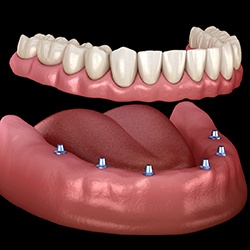
Even patients with full-arch tooth loss can regain a complete smile with dental implants. We can strategically position a small number of implant posts (usually four to eight) throughout the jawbone, providing enough support for a full denture that doesn’t slip or fall out. Implant dentures can be either permanently fixed in place or removable, depending on a patient’s preferences.
Missing All Teeth with Low Jawbone Density
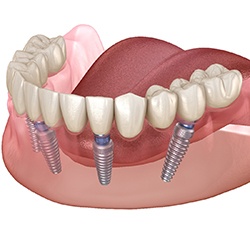
Patients with low jawbone density may not qualify for traditional implant dentures, but they may still be able to rebuild their smiles thanks to All-on-4 dental implants. This state-of-the-art system lives up to its name by using just four implants to successfully support a full, sturdy prosthetic. By positioning the implants at particular angles, All-on-4 takes advantage of the available jawbone density, providing maximum support for a full row of teeth without the need for bone grafting.
The 4-Step Dental Implant Process
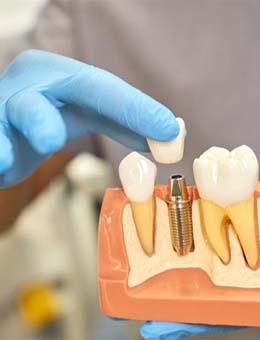
Dental implant treatment is typically broken down into four phases. This includes the planning stage, the surgical placement of the implant posts, the installation of the abutments, and the placement of your final crown, bridge, or denture. Unlike most dental offices, our team at Murphy Family Dentistry can complete every step of the dental implant process in-house, so you can receive streamlined care from the team you already know and trust. While the details of your individual treatment may vary, here’s a basic guideline of how dental implants work in Murphy.
Initial Dental Implant Consultation
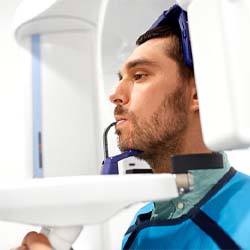
First, you’ll meet with Dr. Najari or Dr. Nguyen, and they’ll spend ample time asking you about your tooth replacement goals, examining your mouth, and ultimately determining whether dental implants are right for you. Using high-resolution cone beam scanning technology, they’ll capture 3D images of your mouth, jaw, and facial structures. These images can help our team plan out exactly where to place your implants as well as whether you’ll require preliminary procedures before that point. For example, patients who have experienced bone loss in their jaws may need to undergo bone grafting before implants can have a sturdy foundation.
Dental Implant Surgery

After any preparatory work is completed, or if you didn’t need any, we can move forward to the surgical portion of your treatment. Dental implant surgery requires a great deal of expertise as well as trust between you and your implant dentist in Murphy. That’s why it’s easier to visit a dental practice that can place implants in-house, like we can.
We’ll ensure that your mouth is numbed before making small incisions at precise locations in your gum tissue. Through these incisions, we position the implant posts within your jawbone based on the images we captured during your consultation. Then, we close your gums and send you home to heal.
Dental Implant Osseointegration & Abutment
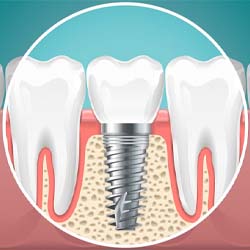
Over the course of the next three to six months, a special process known as osseointegration will occur. During osseointegration, your implants will naturally fuse with your jawbone, forming a bond that mimics the one between your ridge and your natural tooth roots.
At that point, we can attach your abutments. You’ll undergo a smaller oral surgery, during which we expose the tops of your implant posts and secure metal connectors onto them. The abutments will allow us to secure your custom restorations into place, but you’ll typically have to wait a couple of weeks for your gums to fully recover from abutment surgery.
Delivery of Dental Implant Restoration(s)

Once the abutment process is finished, it’s time to complete the visual part of your smile. Because dental implants in Murphy are so versatile, your final restoration might be a dental crown, bridge, or denture – depending on the number of teeth you’re looking to replace. Your restoration will have been personalized to match your natural teeth and blend in discreetly with the rest of your smile.
Understanding the Cost of Dental Implants

Determining the cost of dental implant treatment is virtually impossible before we’ve considered all of the factors that come into play, such as the number of implant posts required and the type of restoration that your smile will need. That’s why the price of your treatment is unlikely to be exactly the same as that of any other patient.
Dental implants in Murphy are certainly an investment, but we strongly believe that they’re more than worth it. While more traditional services like dentures and bridges are likely to require pricey replacements over the years, dental implants can thrive for decades, making them the more cost-effective solution in the long term.
Preliminary Treatments & Dental Implant Surgery

It’s fairly common for patients to need one or more preparatory procedures before dental implants can safely be placed. These additional treatments are most often needed when a patient has suffered from jawbone loss, is currently experiencing gum disease, or needs an extremely damaged or decayed tooth to be removed. Rest assured that the cost of bone grafting, gum disease treatment, or tooth extractions will be worth it when your new teeth have the healthy foundation they need.
Another variable that affects your total treatment costs is the actual dental implant surgery. Luckily, your costs will be less than they would be at many other dental practices. As an experienced implant dentist in Murphy, Dr. Najari can perform this procedure in-house, sparing you from having to pay a separate bill to an outside dental office.
The Parts of Your Dental Implant

Each of the three parts of your dental implant – the implant post, the restoration, and the abutment that connects the two – will incur its own cost. The posts and abutments can be made from various metals, which all come at different price points. The restorations are generally crafted from ceramic or porcelain, but again, the specific material will impact your cost.
Additionally, the number of teeth you’re replacing plays a major role in determining the cost of dental implants in Murphy. Not only do we have to consider the number of implant posts, but also the type of restoration. For example, replacing one missing tooth with a single implant and crown will naturally have a lower price than replacing an entire arch with four to six implants and a full denture.
How Dental Implants Can Save You Money

Once you see the initial price of dental implants, you might be skeptical as to the idea that they could save you money. Consider this, though – dental implants have the potential to last for 30 years or longer. Regular dentures and bridges only last for five to 10 years at most. Not only do they have to be replaced frequently, but they also require special maintenance products and adhesives (in the case of dentures). They may be cheaper up front, but over time, dental implants are clearly the smarter investment to make.
Does My Dental Insurance Cover Dental Implants?

While many dental insurance providers don’t cover dental implants or their surgical placement, this isn’t always the case. Your plan may partially cover your final restorations or your preliminary treatments, for example. At Murphy Family Dentistry, we accept practically all dental PPOs and can even file claims for you, making the process much easier.
Making Dental Implants Affordable

If you need additional assistance making the cost of dental implants fit into your budget, we have options. Whether or not you have insurance, you’re welcome to apply for a low- to no-interest payment plan through CareCredit. We’re also currently running a special where uninsured patients can save $1,000 on a start-to-finish dental implant treatment plan.
Dental Implant Technology
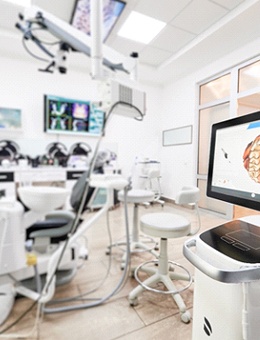
The skill of the dentists in our practice plays a large role in helping patients enjoy successful dental implant treatment. However, dental implant technology in Murphy is also important. The right tools, used in the right way, can do much to make your tooth replacement journey as efficient and low-risk as possible. Below, you can learn more about some of the remarkable instruments that we use.
3D Cone Beam Imaging
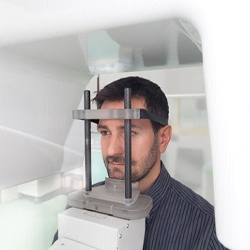
A traditional digital X-Ray is an invaluable tool. It captures useful images of the jawbone and teeth that we can use for a number of purposes. However, it does not provide the level of detail that we need to plan dental implant treatment. That is why we have invested in a CBCT machine, also called a cone beam scanner. It uses a cone-shaped beam of radiation to produce highly detailed, three-dimensional images of a patient’s bone, teeth, nerves, and connective tissues. The scanning process is quick, noninvasive, and completely painless.
Guided Dental Implant Surgery
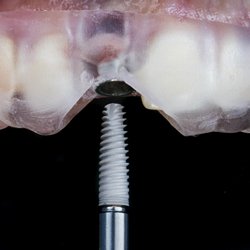
Traditionally, dental implants are placed using freehand techniques. That is to say, the dentist takes their “best guess” at where, how deep, and at which angle to insert a dental implant into a patient’s jaw. In most cases, especially simple ones, freehand placement works out well. However, in instances where multiple implants are being placed or there are other complicating factors, guided surgery is superior.
Prior to your surgery, we use our CBCT machine and the help of a dental laboratory to create a custom surgical guide. During your procedure, it will minimize the risk of human error and likely help you enjoy a shorter post-op recovery time.
Digital Impression System
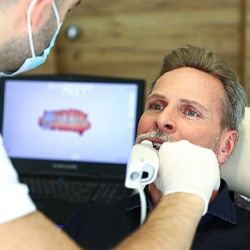
During the restoration stage of your dental implant treatment, we must pay great attention to detail as we design the crown, bridge, or denture that will get attached to your dental implants in Murphy. Part of the design process involves taking impressions of your mouth. Many practices use manual tools, including tooth trays and putty, to capture impressions. Patients often find this part of their treatment to be uncomfortable.
We take a different approach. We use a digital scanner, which we move around your mouth so it can capture thousands of images of your teeth and gums. It then assembles those images into an accurate digital representation that we can use to design your restoration.
Nobel Biocare Dental Implant System
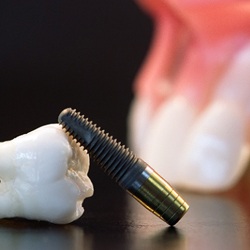
Nobel Biocare is a company at the forefront of dental implant technology. They manufacture a range of products, including dental implants, abutments, and more — all of which are made with top-tier materials and designed to work seamlessly together. The company has more than 50 years and millions of dollars of research backing up its products. As an experienced implant dentist in Murphy, we choose Nobel Biocare products because they have a track record of success, and we want our patients to enjoy the very best form of tooth replacement available.
Advanced Dental Implant Procedures

Sometimes, you might be told that you aren’t currently a good candidate for dental implants. But that doesn’t mean the treatment option is closed to you for good; you may still be able to have implants placed thanks to the state-of-the-art procedures we offer! While these treatments may add to the overall cost, they can ultimately help pay for themselves by helping your implants last a lifetime. Below are a few of the treatments that can help make implant surgery a success.
Bone Grafting
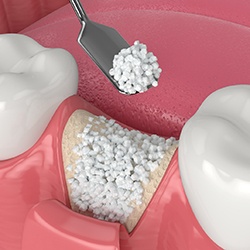
Tooth loss and bone loss are very closely related. Without your teeth, your jawbone won’t receive regular stimulation from biting and chewing; as a result, the body will decide that the bone tissue in that area is no longer needed and allow it to break down. This can be very problematic because a weakened jaw with low bone density may not be able to support dental implant posts.
If bone loss has already occurred in your jaw, we can offer a solution: bone grafting. Simply put, we just need to place new tissue in the areas where the bone has broken down. This encourages healing in the area, strengthening the jaw until it reaches the point where implant surgery can be performed.
The bone grafting process usually involves taking bone tissue from elsewhere in your body; a donor’s tissue might be used instead depending on your circumstances. Note that after bone grafting is complete, it will take time for the mouth to fully recover to the point where implant surgery can be performed. Healing time is different for every patient, but it’s usually a matter of several months.
PRP/PRF Treatment
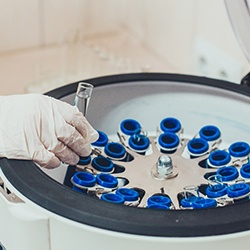
PRP therapy and PRF therapy can both be used to speed up healing after dental implants are placed. First, we take a small sample of your blood and spin it in a centrifuge to separate out the platelet-rich plasma (PRP) or the platelet-rich fibrin (PRF). Both PRP and PRF contain growth factors that can aid the body’s natural healing process.
Once we’ve collected the PRP/PRF, we can apply it to the implant surgery site. This will significantly accelerate the healing of the tissues, and it has been clinically proven to reduce the risk of complications (such as infection) after your implant procedure. Patients who receive PRP/PRF treatment are less likely to need strong pain medication and anti-inflammatories during recovery.
We recommend PRP/PRF after dental implant placement as well as a number of other procedures. It’s especially a good choice for patients whose bodies have trouble healing properly. That said, people with blood clotting disorders may not be able to have the treatment done. We’ll need to carefully evaluate your health history before we decide whether PRP/PRF is right for you.
Maintaining & Caring For Your Dental Implants

Dental implants are incredibly durable, but you’ll still need to make sure you’re taking the right steps to protect them going forward. Just like you would with natural teeth, this includes proper at-home oral hygiene, maintaining a healthy diet, committing to routine checkups and more. Below, we’ve broken down the most important steps to keep in mind for your convenience. If you need more guidance on dental implant care, either ahead of your treatment or after the implants are placed and restored, don’t hesitate to ask!
Make Oral Hygiene a Priority

Bacteria cannot break down the restoration that sits on top of your dental implant, but you’ll still need to brush and floss every day to keep the implant healthy. This is because bacteria can still attack the gum tissue that surrounds the implant. Brushing twice a day with a fluoridated toothpaste and flossing at least once a day will do the trick. For an extra thorough clean, consider adding an ADA-approved oral rinse to your routine.
Eat a Healthy Diet

Once your dental implants are fully healed, we understand why you’re likely excited to start eating some of your favorite foods again. Just keep in mind that just like with natural teeth, you should keep your diet as balanced as possible. It’s okay to indulge once in a while, as long as you also get a healthy serving of vegetables, fruits, dairy, and lean proteins every day. Proper nutrition is incredibly important to providing your mouth what it needs to remain healthy, such as vitamin C, calcium, vitamin D, fluoride, and vitamin A, just to name a few.
Break Bad Habits

Dental implants are designed to withstand average day-to-day use, not make your smile superhuman. For example, you should always take a moment to recognize any bad habits you have and how they could be damaging your dental implant and reducing its longevity. For example, you should avoid:
- Biting your fingernails
- Using your teeth as a tool
- Chewing on ice cubes, pens, pencils, toothpicks, or other inanimate objects
- Using tobacco in any form
Protect Your Dental Implants

Do you find yourself grinding your teeth often? Enjoy playing sports where there is a high risk for sudden impact? You’ll need to give yourself the right protection ahead of time. For example, a custom nightguard can act as a cushion for your teeth (and your implant), preventing wear and tear on your enamel and dedicated restoration. Additionally, a mouthguard will reduce the risk of your teeth cracking, chipping, or getting knocked out while being active.
Schedule Regular Dental Checkups

You should visit our office every six months for a routine checkup and cleaning, not just so we can examine your dental implant and its restoration, but the rest of your smile as well! Dental problems have a tendency to develop without even being aware of it, which is why consistent visits matter to your long-term oral health.
Dental Implant FAQs
Compared to many other dental procedures, dental implants are one of the most complex. As a result, you may have questions about it before you decide to replace your teeth with them. We understand and want to help you make the best decision for you. Below are some of the commonly asked questions that patients ask about dental implants in Murphy and our responses to them. We invite you to read our answers, but feel free to reach out to our practice if you have other questions about implants.
How Successful Are Dental Implants?
When handled by a highly trained and experienced professional, dental implants are remarkably successful. In fact, even 20 years after the initial placement, over 95% of dental implants are still a success. However, it’s important to keep in mind that the success and longevity of the implants largely depend on how well you maintain them with daily oral hygiene, routine checkups, and a healthy diet. Also, molars experience more stress from chewing, so they may be slightly more likely to fail than front teeth.
Does Getting Dental Implants Hurt?
Before our team starts the procedure, we’ll give you a local anesthetic, which means that you’ll be completely numb. The surgery itself should not be painful, but implant placement may leave your mouth feeling sore for a few days. To manage any discomfort, you can take over-the-counter pain medication or prescription medication as instructed. You can also apply a cold compress to your face to help reduce minor pain. After two or three days, discomfort should subside, but if it worsens after this point, you need to contact our office.
Do Dental Implants Decay?
Implants are not susceptible to tooth decay because they are not made of enamel. As a result, you don’t need to worry about your implants getting cavities. However, you still need to keep up with healthy oral habits like brushing and flossing and continue coming to our office for checkups and cleanings. if you have any natural teeth left, they can still develop decay, and your gums can still become infected.
Are Dental Implants Covered with Insurance?
Insurance coverage can vary from patient to patient. Our team would need to take a close look at your policy to determine which parts of the process are covered in your benefits. In general, the placement procedure is not a covered services, but the restoration is. Also, if you need preliminary work, such as a tooth extraction or gum disease therapy, this work may be included in your insurance benefits. We can happily go through your plan with you and help you find ways to save on your costs.
Dental Implants Post-Op Instructions

Thanks to the expertise of our dentists, we’re able to keep your entire dental implant placement process in-house. Once you do receive your dental implants, whether you’re replacing a single tooth or all the teeth in your smile, you’ll need to take precautions to ensure the smoothest recovery possible. This is especially important immediately after you head home from our office. We recommend following the tips below; if you have additional questions or concerns, you can call our office at any time.
What to Do Directly After Dental Implant Surgery

The surgery itself is one of the more difficult parts of the tooth replacement process. Thankfully, a little care and attention after treatment is more than enough to make the recovery process relatively smooth and comfortable. For example, keeping the newly formed blood clot on your open socket protected and untouched is crucial. This can be done by:
- Swallowing saliva, rather than spitting it out (this can dislodge the blood clot)
- Avoiding straws for the next several days
- Never using tobacco products
- Keeping your fingers and tongue away from the implant site
Common Side-Effects

The side effects of oral surgery can be concerning for those that have never completed it before. However, the more aware of them you are, the less concerned you’ll need to be. In the first 24 hours after dental implant placement, you may experience some mild discomfort. This is a normal part of the healing process and can be managed with prescribed and over-the-counter painkillers. Other common side effects include:
- Intermittent bouts of bleeding (easily managed by applying small pressure on the implant site with gauze)
- Facial swelling (which can be reduced with cold compresses)
Diet

Like with any oral surgery, a soft diet is key to a speedy recovery. For example, we do recommend that you have the following foods available to you after you complete your dental implant treatment:
- Pudding
- Applesauce
- Cold soups
- Eggs
- Pasta
- Yogurt
- Ice cream
- Mashed potatoes
As you heal, you can slowly start to reintroduce new foods to your diet when you feel comfortable doing so.
Health & Oral Hygiene

To ensure successful integration and prevent dental disease, you’ll need to practice oral hygiene. Some helpful tips to keep in mind include:
- Gently brushing and flossing your teeth, especially around the treatment site
- Rinsing your mouth out with either a prescribed mouthwash or salt water two to three times a day (just make sure not to spit!)
- Avoiding mouthwashes that contain alcohol, which can lead to dry mouth
What to Do After Your New Teeth Are Attached

After your implant has fully healed and fused with your bone tissue, you should be able to receive your permanent restoration! After the restoration is placed, it’s normal to experience some mild sensitivity in your gum tissue. Additional pain medications can help alleviate this side effect. If you do notice swelling or bleeding after the restoration is attached, please call our office right away.
Which Option Is Right for Me?
If you're not sure which implant option is right for you, Dr. Najari or Dr. Nguyen would be happy to complete a comprehensive exam for you. Contact our Murphy dental office today to reserve your free consultation.
